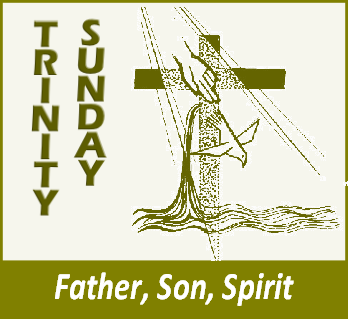Readings: Exodus 34:4-6, 8-9; 2 Corinthians 13:11-13; John 3:16-18
Theme: ‘God of tenderness and compassion ‘ (Ex 34:6)
Many of you, I’m sure, remember the popular song, ‘From a Distance’. Composed by Julie Gold in 1985, it became a major hit for Bette Middler. It’s a beautiful hope-filled anthem, envisioning a world of justice, peace and harmony, as seen through God’s eyes, from a distance. The refrain goes like this: God is watching us; God is watching us; God is watching us, from a distance’. Julie Gold’s lyrics remind me of a story I came across some years ago about a young boy who was intrigued by a colourful mural in the home of his aunt. It featured the biblical text: ‘You are the God who sees me’ (Gen: 16:13). Noticing her young nephew’s interest in the mural, the kindly aunt decided to explain the words to him. ‘Some people will tell you’, she said, ‘that God is always watching you to see if you are doing wrong. But this is not what the words mean. God is not watching you to catch you out, but because he loves you so much that he cannot take his eyes off you’.
Today’s gospel passage from John carries the same message. It presents a conversation between a Pharisee, and leading member of the Jewish Ruling Council, named Nicodemus, and Jesus. Impressed by the reports he has heard about Jesus, but fearful of reaction of his fellow-Pharisees, Nicodemus approaches Jesus under cover of darkness. In response to Nicodemus’ questions, Jesus makes the astounding declaration: ‘God loved the world so much that he sent his only Son … not to condemn the world but so that through him the world might be saved’ (Jn 3:16-17).
This is the heart of the Gospel – the good news of God’s unconditional love for the world. We are not, to cite a frightful image used by Gloucester in King Lear. ‘as flies to wanton boys [who] kill us for their sport’. We are not creatures of a cruel and capricious deity, but children of a God of unimaginable love and tenderness. The same truth is also affirmed in today’s first reading from the book of Exodus. Speaking with God ,Moses, is assured, that however unfaithful and headstrong the chosen people have shown themselves to be, God remains the God of faithful love, ‘a God merciful and gracious, slow to anger and abounding in steadfast love faithfulness’ (Ex 34:6).
Today, Trinity Sunday, we are celebrating, not a mathematical conundrum, but the mystery of God’s unfathomable love. The God who dwells in inaccessible light and eternal glory comes to us in the face of Jesus and the activity of the Holy Spirit. The lyrics of Julie Gold’s song, to which I referred at the beginning of his homily, might seem to suggest that God is watching us from afar, from a distance. However the God revealed in the Bible is not some remote and distant deity, but a God who is close to us and involved with us.
The God revealed especially in the life and ministry of his Son, Jesus, is a loving Father who is interested in, and cares for, all creatures from the smallest to the greatest, a passionate and compassionate God, capable of being deeply moved by the sufferings of his creatures. In the words of Pope Francis, the Scriptures reveal a ‘God of Love who created the universe and generated a people, became flesh, died and rose for us, and, as the Holy Spirit, transforms everything and brings it to fullness’. This is the God who is Father, Son and Spirit.
The Trinity is not just a dogma to be accepted in faith, or a formula to be recited in our liturgy. It is the generative and dynamic core of our Christian way of life. It is ultimately about what it means to be human persons created in the image of the God of Love. To be human means to be like the God who created us, the God in whom all creatures live and move and have their being, and who are intimately connected with one another. It means to live in relationships of love and respect, nor only for our fellow humans, but for all God’s creatures with whom we share the gift of life.
Our liturgy today invites each of us to acknowledge and deepen our participation in the Trinitarian communion of Father, Son and Spirit through our loving communion with one another and, indeed, with all creation. I can think of no better way of responding to this invitation than by reciting and reflecting on the great Trinitarian prayer of St Patrick, mindful that God loves us so much he cannot take his eyes off us. I end with a few verses of Patrick’s Breastplate or Lorica.
I arise today
Through a mighty strength, the invocation of the Trinity,
Through a belief in the Threeness,
Through confession of the Oneness
Of the Creator of creation….
I arise today
Through God’s strength to pilot me;
God’s might to uphold me,
God’s wisdom to guide me,
God’s eye to look before me,
God’s ear to hear me,
God’s word to speak for me,
God’s hand to guard me,
God’s way to lie before me,
God’s shield to protect me,
God’s hosts to save me…
Christ with me, Christ before me, Christ behind me,
Christ in me, Christ beneath me, Christ above me,
Christ on my right, Christ on my left,
Christ when I lie down, Christ when I sit down,
Christ in the heart of everyone who thinks of me,
Christ in the mouth of everyone who speaks of me,
Christ in the eye that sees me,
Christ in the ear that hears me.
Michael McCabe SMA
To listen to an alternative Homily for this Sunday, from Fr Tom Casey of the SMA Media Centre, Ndola, Zambia please click on the play button below.

